- Home
- Cherie Priest
The Inexplicables (Clockwork Century)
The Inexplicables (Clockwork Century) Read online
The author and publisher have provided this e-book to you without Digital Rights Management software (DRM) applied so that you can enjoy reading it on your personal devices. This e-book is for your personal use only. You may not print or post this e-book, or make this e-book publicly available in any way. You may not copy, reproduce, or upload this e-book, other than to read it on one of your personal devices.
Copyright infringement is against the law. If you believe the copy of this e-book you are reading infringes on the author’s copyright, please notify the publisher at: us.macmillanusa.com/piracy.
For Angeline and her father
For Seattle
Acknowledgments
It feels strange knowing that The Inexplicables will probably be the last book I write in Seattle. I won’t say “absolutely the last” because one never knows, and it’s not like I’m planning to run away and never look back; but as you may or may not know, my husband and I bought a house in Tennessee … and by the time you read this, we will be living in Chattanooga (once again).
We lived in Seattle for six years, and in many ways, the city was very, very kind to me. It gave me Boneshaker, after all—as well as the subsequent books in the Clockwork Century series. None of these stories would’ve ever happened if I hadn’t come out West in 2006, so I will always be grateful for my time here.
Thank you, Seattle. You gave me more than I deserved, and I was not always gracious about it. I hope I’ve done you proud with these stories. They are a song of appreciation.
So. Yes.
When it comes to more specific thanks, I scarcely know where to begin. But this time, I’ll save the usual suspects for the end and start with the local crew.
Thanks of the highest order go to the bookstore folks: Duane Wilkins, plus Caitlin and Art, and everyone else at the University Book Store; Steve Winter and Vlad Verano at Third Place Books; and all the kind people at the Seattle Mystery Book Store, who have carried a torch for my Eden books (much to my continued delight).
Thanks of a matching caliber go to my wonderful friends of the writing and non-writing variety. To the Cap Hill Crew—Ellen Milne, Suezie Hagy, and Nova Barlow; to Jillian and Pete Venters—two lovely and loving grown-up Goths who I simply can’t recommend enough; Richelle Mead and Mark Henry for being cornerstones in my first actual group of Writer Buddies; and to Kat Richardson, another cornerstone—who has become one of my very dearest friends in the last couple of years. Also, I must note the amazing Mary Robinette Kowal, who, it must be mentioned with some small measure of irony, hails from Chattanooga. But I did not know her—or come to adore her—until we met on the West Coast.
Further thanks to the following folks for their outstanding support in a personal and professional nature, though they aren’t Northwest locals: George R. R. Martin, for teaching me more about writing in six months than a four-year B.A. and three years of grad school ever did; Sam Sykes, a damn fine convention pal and all-round great correspondent; John Scalzi, for good guesses and secret-keeping; William Schafer, for his persistent waving of pom-poms in my general direction, even though I’m a horrible person who hasn’t written that next novella for him yet; Mike Lee, for talking me off the ledge repeatedly re: THINGS THAT ARE SECRET and might be secret forever; Wil Wheaton, for his effervescent enthusiasm and unwavering positivity; Warren Ellis, a man I can’t help but idolize and constantly want to hug, so it’s just as well (for his sake) that he’s overseas; Jess Nevins, the kindest, most brilliant archivist in Texas and well beyond; and to everyone else in the clubhouse that serves the world—you people know who you are, and why I love you.
And now to the publishing team—the people who prop me up, urge me on, keep me moving, and make all the magic happen.
A million and one thanks to my editor, the inimitable Liz Gorinsky, who saves me every damn day; my amazing agent, Jennifer Jackson, because, dear God, I don’t know how I’d ever survive this business without her on my side; my publicist, Aisha Cloud, who sends me on the road and takes care of me while I’m there; Irene Gallo in the art department for all the beautiful covers; and everyone else at Tor who helps these books find their way into the world.
Lifesavers, each and every one of them.
And finally, thanks to my husband, Jaymes Aric Annear—who loves me enough to come home with me. I couldn’t do it without him.
Contents
Title Page
Copyright Notice
Dedication
Acknowledgments
Map of Seattle
Epigraph
Chapter 1
Chapter 2
Chapter 3
Chapter 4
Chapter 5
Chapter 6
Chapter 7
Chapter 8
Chapter 9
Chapter 10
Chapter 11
Chapter 12
Chapter 13
Chapter 14
Chapter 15
Chapter 16
Chapter 17
Chapter 18
Chapter 19
Chapter 20
Chapter 21
Chapter 22
Chapter 23
Chapter 24
Chapter 25
Chapter 26
Chapter 27
Chapter 28
Chapter 29
Chapter 30
Epilogue
Tor Books by Cherie Priest
About the Author
Copyright
So I became a dreamer, and acquired an indisposition to all bodily activity; and I was fretful and inordinately passionate, and as I could not play at anything, and was slothful, I was despised and hated by the boys.
—SAMUEL TAYLOR COLERIDGE,
in a letter to his friend Thomas Poole
One
Rector “Wreck’em” Sherman was delivered to the Sisters of Loving Grace Home for Orphans the week it opened, on February 9, 1864. His precise age was undetermined, but estimated at approximately two years. He was filthy, hungry, and shoeless, wearing nothing on his feet except a pair of wool socks someone, somewhere, had lovingly knitted for him before the city went to hell. Whether she had been mother or nursemaid, governess or grandmother, no one knew and no one ever learned; but the child’s vivid red hair, pearl white skin, and early suggestions of freckles implied rather strongly that he was no relation to the Duwamish woman who brought him to the shelter. She’d carried him there, along with another child who did not survive the month. Her own name was lost to history, or it was lost to incomplete records only sometimes kept in the wake of the Boneshaker catastrophe.
The little boy who lived, the one with hair the color of freshly cut carrots, was handed over to a nun with eyes too sad for someone so young and a habit too large for someone so small. The native woman who toted Rector told her only his name, and that “There is no one left to love him. I do not know this other boy, or what he is called. I found him in the bricks.”
For a long time, Rector did not talk.
He did not babble or gesture or make any sound at all, except to cry. When he did, it was a strange cry—all the nuns agreed, and nodded their accord sadly, as though something ought to be done about it—a soft, hooting sob like the desolate summons of a baby owl. And when the dark-haired boy who’d been his circumstantial companion passed away from Blight poisoning, or typhoid, or cholera, or whatever else ravaged the surviving population that week … Rector stopped crying as well.
He grew into a pallid, gangly thing, skinny like most of the refugees. At first, people in the Outskirts had bartered for what they could and took ships and airships out into the Sound to fish; but within six months, Blight-poisoned rainwater meant that
little would grow near the abandoned city. And many of the children—the ones like Rector, lost and recovered—were stunted by the taint of what had happened. They were halted, slowed, or twisted by the very air they’d breathed when they were still young enough to be shaped by such things.
All in all, Rector’s teenage condition could’ve been worse.
He could’ve had legs of uneven lengths, or eyes without whites—only yellows. He might’ve become a young man without any hair, even eyebrows or lashes. He might’ve had far too many teeth, or none at all. His spine might have turned as his height overtook him, leaving him lame and coiled, walking with tremendous difficulty and sitting in pain.
But there was nothing wrong with him on the outside.
And therefore, able-bodied and quick-minded (if sometimes mean, and sometimes accused of petty criminal acts), he was expected to become a man and support himself. Either he could join the church and take up the ministry—which no one expected, or even, frankly, wanted—or he could trudge across the mud flats and take up a job in the new sawmill (if he was lucky) or at the waterworks plant (if he was not). Regardless, time had run out on Rector Sherman, specific age unknown, but certainly—by now—at least eighteen years.
And that meant he had to go.
Today.
Sometime after midnight and long before breakfast—the time at which he would be required to vacate the premises—Rector awoke as he usually did: confused and cold, and with an aching head, and absolutely everything hurting.
Everything often hurt, so he had taken to soothing the pain with the aid of sap, which would bring on another pain and call for a stronger dose. And when it had all cycled through him, when his blood was thick and sluggish, when there was nothing else to stimulate or sedate or propel him through his nightmares … he woke up. And he wanted more.
It was all he could think about, usurping even the astonishing fact that he had no idea where he was going to sleep the next night, or how he was going to feed himself after breakfast.
He lay still for a full minute, listening to his heart surge, bang, slam, and settle.
This loop, this perpetual rolling hiccup of discomfort, was an old friend. His hours stuttered. They stammered, repeated themselves, and left him at the same place as always, back at the beginning. Reaching for more, even when there wasn’t any.
Downstairs in the common room the great grandfather clock chimed two—so that was one mystery solved without lifting his head off the pillow. A minor victory, but one worth counting. It was two o’clock in the morning, so he had five hours left before the nuns would feed him and send him on his way.
Rector’s thoughts moved as if they struggled through glue, but they gradually churned at a more ordinary pace as his body reluctantly pulled itself together. He listened over the thudding, dull bang of his heart and detected two sets of snores, one slumbering mumble, and the low, steady breaths of a deep, silent sleeper.
Five boys to a room. He was the oldest.
And he was the last one present who’d been orphaned by the Blight. Everyone else from that poisoned generation had grown up and moved on to something else by now—everyone but Rector, who had done his noble best to refuse adulthood or die before meeting it, whichever was easier.
He whispered to the ceiling, “One more thing I failed at for sure.” Because, goddammit, he was still alive.
In the back of his mind, a shadow shook. It wavered across his vision, a flash of darkness shaped like someone familiar, someone gone. He blinked to banish it, but failed at that, too.
It hovered at the far edge of what he could see, as opposed to what he couldn’t.
He breathed, “No,” knowing that the word had no power. He added, “I know you’re not really here.” But that was a lie, and it was meaningless. He didn’t know. He wasn’t sure. Even with his eyes smashed shut like they were welded that way, he could see the figure outlined against the inside of his lids. It was skinny like him, and a little younger. Not much, but enough to make a difference in size. It moved with the furtive unhappiness of something that has often been mocked or kicked.
It shifted on featherlight feet between the boys’ beds, like a feral cat ready to dodge a hurled shoe.
Rector huddled beneath his insufficient blankets and drew his feet against himself, knees up, panting under the covers and smelling his own stale breath. “Go away,” he commanded aloud. “I don’t know why you keep coming here.”
Because you’re here.
“I didn’t hurt you.”
You sent me someplace where you knew I’d get hurt.
“No, I only told you how to get there. Everything else was you. It was all your own doing. You’re just looking for someone to blame. You’re just mad about being dead.”
You murdered me. The least you could do is bury me.
The ghost of Ezekiel Wilkes quivered. It came forward, mothlike, to the candle of Rector’s guilt.
You left me there.
“And I told you, I’ll come find you. I’ll come fix it, if I can.”
He waited until his heart had calmed, and he heard only the farts, sniffles, and sighs that made up the nighttime music of the orphans’ home. He moved his legs slowly beneath the blanket until his feet dangled off the edge of the flat straw mattress.
The air on the other side of the blanket was cold, but no colder than usual; it seeped through the holes in his socks and stabbed at the soft places between his toes. He flexed them and shivered. His boots were positioned just right, so he could drop down into them without even looking. He did so, wriggling his ankles until he’d wedged his feet securely into the worn brown leather, and he did not bother to reach down and tie their laces. The boots flopped quietly against the floor as he extracted himself from the bedding and reached for the jacket he’d left over the footboard. He put it on and stood there shaking in the frigid morning darkness. He blew on his hands to briefly warm them, then took a deep breath that he held inside to stretch his chest and urge himself more fully awake.
He was already wearing gray wool pants and a dull flannel shirt. He slept in them, more often than not. It was entirely too cold in the orphan’s home to sleep in more civilized, sleep-specific attire—even in what was considered summer almost anywhere else in the country.
In the Northwest, they called this time of year the June Gloom.
Until the end of July, the clouds always hung low and close and cold. Everything stayed damp even if it wasn’t raining, and usually, it was. Most of the time it wasn’t a hard rain, but a slow, persistent patter that never dried or went away. The days didn’t warm, and at least once a week there was frost in the morning. People grumbled about how It’s never usually like this, but as far as Rector could recall, it was never usually any different. So on the third of June in 1880, Rector’s teeth chattered and he wished for something warmer to take with him.
Cobwebs stirred in the corners of Rector’s mind, reminding him that something dead was prone to walking there. It kept its distance for now—maybe this was one of the benefits to being unwillingly sober and alert, but Rector didn’t want to count on it. He knew too well how the thing came and went, how it hovered and accused, whether he was waking or sleeping.
And it was getting stronger.
Why was that? He had his theories.
The way Rector saw it, he was dying—killing himself slowly and nastily with sap, the potent, terrible drug made from the poisoned air inside the city walls. No one used it more than a year or two and lived, or lived in any condition worth calling that. Rector had no illusions. He didn’t even mind. If anything, his death would factor nicely into his plan to evade responsibility in the long term, even if he was being forced to address it in the short term.
Dead was easier than alive. But the closer he got to being dead, the nearer his dead old chums were able to get to him. It wasn’t fair, really—it was hard to fight with a ghost when he wasn’t yet a ghost himself. He suspected it’d be a much simpler interaction when he a
nd Zeke were both in a position to scare the bejeezus out of each other, or however that worked.
He exhaled hard, and was dimly glad to note that he could not see his breath. This morning was not as cold as some.
And, dammit all, he was almost out of sap.
In the bottom of his left coat pocket, Rector had constructed a secret corner pocket, between the two threadbare layers that made up his only outerwear. Down there, nestled in a crinkly piece of waxed wrapper, a folded slip held a very small amount of the perilous yellow dust.
Rector resisted the urge to seize it, lest the added noise from the paper summon someone’s half-asleep attention. Instead, he comforted himself with the knowledge that it (still, barely) existed, and he jammed a black knit hat down over his ears.
He surveyed the room.
It was too dark to see anything clearly. But he knew the layout, knew the beds.
Seizing his own blanket by the corner, he folded it in half and laid out his few personal effects: One extra pair of socks, in no better shape than the ones he wore already. One additional shirt, neither smelling fresher nor appearing newer than what he had on. A box of matches. An old gas mask, soft from years of being worn by somebody else, but still working fine. Rector didn’t have any extra filters, but the ones in the mask were new. He’d stolen them last week, just like he stole everything else he’d ever owned: on a whim, or so he’d thought at the time. In retrospect, the idea might’ve already been brewing, bubbling on a back burner where he hadn’t noticed it yet.
He reached underneath the mattress, to a spot where the fabric covering had rubbed itself threadbare against the slats that held it above the floor. Feeling around with his left hand, he retrieved a small bag he’d stitched together from strips of a burlap bag that once held horse feed. Now it held other things, things he didn’t particularly want found, or taken away.
He added this pouch to the stash on the bed and tied up the corners of the blanket. The blanket wasn’t really his to commandeer, but that wouldn’t stop him. The Home was throwing him out, wasn’t it? He figured that meant that the muttering nuns and the cadaverous priest practically owed him. How could they expect a young man to make his way through life with nothing but the clothes on his back? The least they could do is give him a blanket.

 Maplecroft
Maplecroft Chapelwood
Chapelwood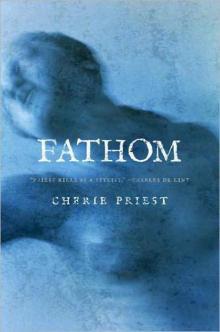 Fathom
Fathom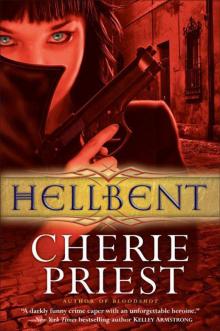 Hellbent
Hellbent Jacaranda
Jacaranda Four and Twenty Blackbirds
Four and Twenty Blackbirds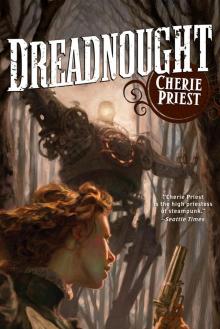 Dreadnought
Dreadnought Dreadful Skin
Dreadful Skin Bloodshot
Bloodshot Tanglefoot
Tanglefoot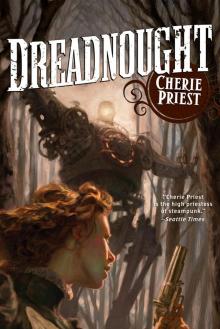 Clementine
Clementine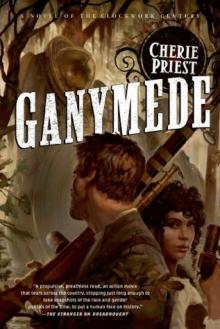 Ganymede
Ganymede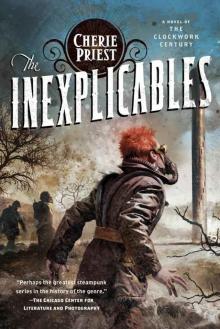 The Inexplicables
The Inexplicables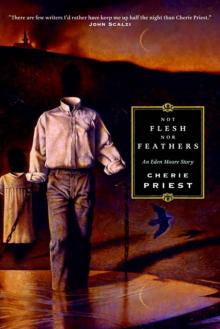 Not Flesh Nor Feathers
Not Flesh Nor Feathers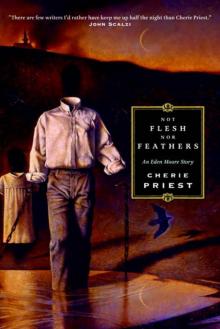 Wings to the Kingdom
Wings to the Kingdom Fiddlehead
Fiddlehead Tanglefoot: A Story of the Clockwork Century
Tanglefoot: A Story of the Clockwork Century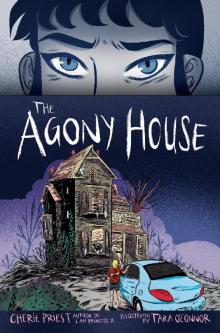 The Agony House
The Agony House Ganymede (Clockwork Century)
Ganymede (Clockwork Century)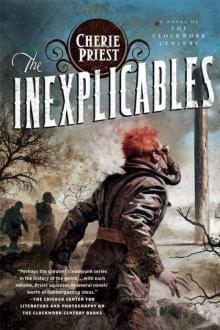 The Inexplicables (Clockwork Century)
The Inexplicables (Clockwork Century)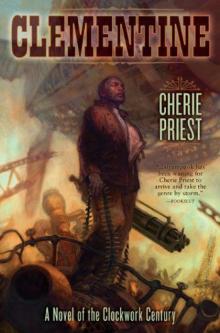 Clementine tcc-2
Clementine tcc-2 Grants Pass
Grants Pass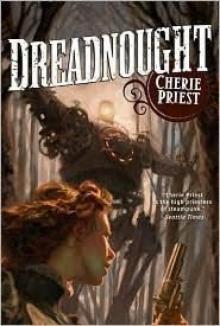 Dreadnought tcc-3
Dreadnought tcc-3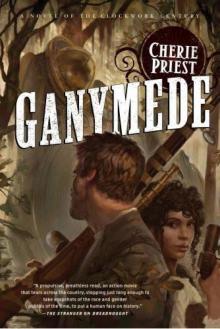 Ganymede tcc-4
Ganymede tcc-4